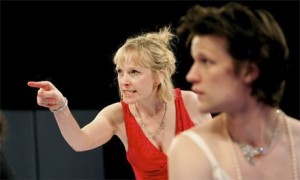The theatre in London has been an important part of my career in the arts from the start. My first published work was the poetry play, Dreams of May. That led to the founding of the charity CurvingRoad, the production of plays both in the fringe and the West End, and more recently the merger of CurvingRoad with the theatre company, Theatre Delicatessen. And through it all, I wrote plays. Two of those plays gathered momentum and interest from established directors and producers. And one of those plays received what I like to call a “good rejection” from one of London’s most important theatres: “We love this play but it’s not right for our programming” – you know the type. Now, I took that as encouragement. But when the same sort of thing happened again and again, I allowed more pressing work issues to push the play writing aside. I focused on my novels, my poetry and my teaching, and told myself that maybe the theatre just wasn’t for me after all. At least, not as a writer.
Last weekend, the National Theatre celebrated it’s 50th birthday with a truly remarkable television presentation of it’s greatest hits. I loved every minute of it. And, as I have become accustomed to doing, I made sure I didn’t think about my own failure to be a part of it. But this morning’s papers have forced me to think again, with two excellent articles appearing discussing, quite knowledgeably, the problem of the lack of plays written by women which are being produced on Britain’s stages. The first is written by the female director and playwright, Sam Potter, for The Guardian, called Does the National Theatre Have a Problem with Women? The second, is the article in the Evening Standard by Lucy Kerbel which bemoans the lack of plays produced for predominantly female casts. Both articles are important and have made me revisit my rather stalled life in the theatre.
It is in my nature to assume that I’m just not good enough. Look, there are women playwrights being produced. How about Lucy Prebble? Polly Stenham? Laura Wade? Yasmina Reza? Well, that’s four, isn’t it? And there must be more. Yes. Well, of course there are, but how many of their works do we get to see? And why not? Potter unearthed some frightening statistics:
* in the past decade, less than 15% of the NT ‘s productions were written by women
* some of the other major London theatres, like the Royal Court and the Almeida, have inched their way up to between 30 and 40%
* The companies which have been the most successful at achieving gender equality, Out of Joint and Theatre 503, have hit between 40 and 50%
This may not sound too bad, but actually, it is shameful. It’s shameful that it is still even an issue. Women’s voices need to be heard. Women’s themes and characters need to be portrayed. British theatre’s continuing role of leadership in Western culture, a role that we have played since before Shakespeare, is one of the things we as a society can be most proud of. We are a society which dares to look at ourselves in the mirror and hold that reflection up for all to see on our public stages. Theatre is one of the most productive ways we have of defining for ourselves and the rest of the world who we are — the good of it and the bad. Where are the women playwrights? We’re here. Where are you?

Recent Comments